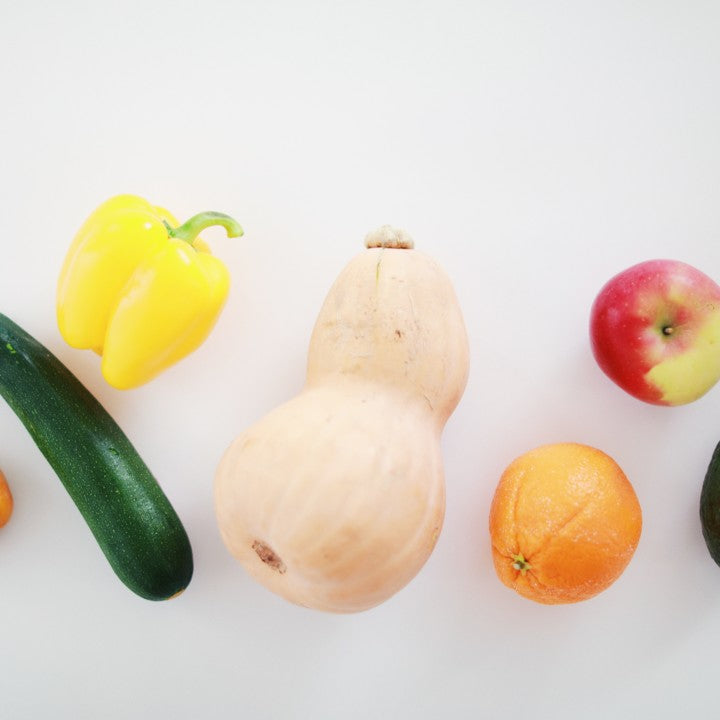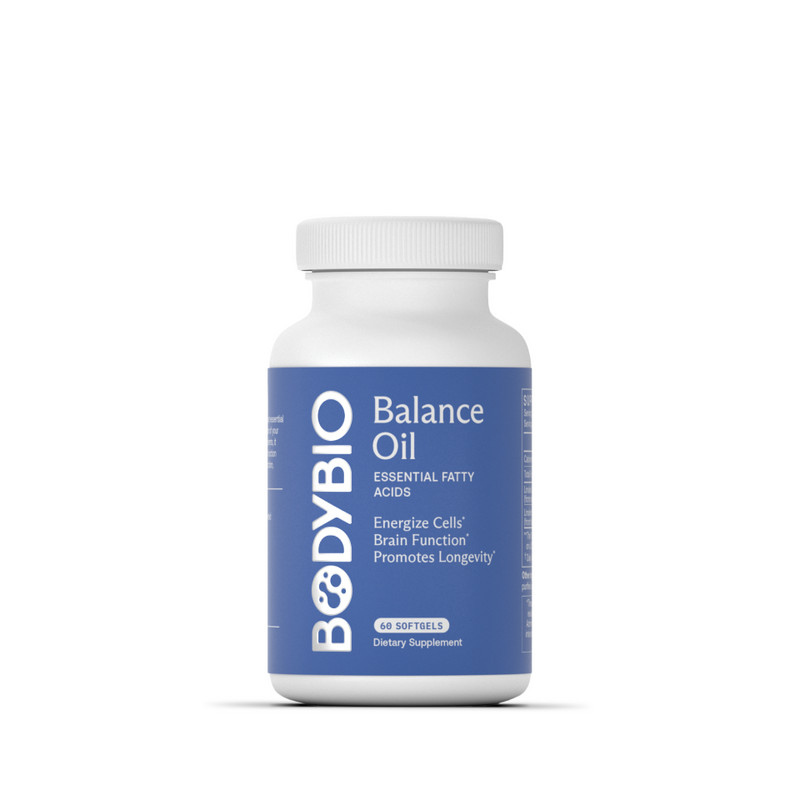Vegans Need Fatty Acids Too
Authors:

Dr. Thomas Wnorowski
PhD, CNCC Research Director, BodyBio & Biomedical NutritionistKEY TAKEAWAYS
- Produce can be labeled as “organic” if it is grown in soil that has been untouched by any man-made chemicals for at least three years prior to its harvest.
- Although those following a vegan lifestyle can get many of the necessary nutrients the body needs from plants, there are some nutrients, such as B12, that are not easily extracted from plants.
- Vitamin D, iron, calcium and zinc should also be deficiency concerns for those following a plant-based diet, especially women.
- Supplementing these nutrients alone, however, is not enough. Being devoid of animal products or by-products, Balance Oil encourages the uptake of fat-soluble nutrients, assuages inflammation and reorganizes an aberrant cell membrane.
First, let’s talk about our food sources…
The organic, non-GMO status of practically everything is questioned these days. Well, not everything, but enough to deserve at least a little attention. That itself is a problem because there is no accepted definition of ‘organic.’ Chemically, the term refers to any substance that contains carbon, meaning that it comes from a living thing, whether presently, like you, or formerly, like a dinosaur. Motor oil, then, is organic, as is gasoline, transmission fluid and mastodon hair. In deciphering the wonderful world of marketing, ‘organic’ carries more weight than ‘natural,’ because n really knows what ‘natural’ means.
Produce can be labeled as “organic” if it is grown in soil that has been untouched by any man-made chemicals for at least three years prior to its harvest. This applies not only to soil, but also to animal rearing practices, pest and weed control and the use of additives (if you’re interested, or just plain nosy, the USDA has a list of prohibited and permitted substances on their website). You can rest assured that at Bodybio, we are intentional about sourcing the finest organic ingredients to use in our supplements.
Genetic modification came about when some overly-friendly chemical company decided that insects should not eat food intended for humans. So, they injected alien genes into a plant’s chromosomes that would render bugs infertile, sterile or dead, all by neutering, starvation, poisoning or central nervous system discombobulation, if they snacked on a crop. The concern is that some of these alien genes come from organisms that do not belong in the same country as people, such as bacterial organisms that eat insects from the inside out. Although this may not be harmful to a human body, it can wreak havoc with a human gut microbiome and wipe out the health-giving bacterial population that helps to make an immune system and that masterminds the manufacture of some vitamins, including vitamin K. These knights in rusted armor also decided that food needs to carry more nutrition than Mother Nature gave it. This is comparable to asking an eight-ounce cup to hold 10 ounces of coffee.
Not all food purveyors are less-than-righteous in their offerings, but those that are might disguise harmful substances behind a mask, such as labeling FD&C Yellow #5, suspected of causing hyperactivity, asthma and migraines, among a few other maladies, as tartrazine. GMO ingredients are disallowed if the ‘organic’ designation appears on a label.
No one has the license to fault another for choosing a plant-based lifestyle. The inverse also applies to omnivores. But there is a legitimate concern that vegans get all the nutrients they need from the foods they do consume. But, not all the nourishment we need is easily extracted from plants, like vitamin B12 and a few fellow travelers.
Plant Based Diets and Vitamin Deficiencies
Vitamin B12
Vegetarians are at risk for vitamin B12 deficiency because of suboptimal intake. It’s not their fault because that vitamin is historically derived from animal sources. But notice the qualifier: historically. That means there might be an exception – Streptomyces griseus and an extended family of cousins, mostly soil-dwelling organisms, the fermentation of which produces (cyano)cobalamin. (Pappworth, 1950). So, yes, there are B12 supplements available to vegans.. Because of leafy greens, legumes and assorted other plants, vegans have a high intake of folate. In itself, that’s fine, but too much masks a B12 deficiency, so be mindful to supplement to avoid anemia. If you get cut shaving, and if your blood is water clear, it’s time to think about your diet, despite the fact that B12 can be stored for months. Red blood cells need B12 to form and to grow. As we age, we often become deficient in the gastric intrinsic factor that assures uptake of B12 from foods, so supplementation is a good idea.
Vitamin D
Vitamin D can be a deficiency concern in omnivores as well as vegans. People are afraid of the sun. Fifteen minutes of bared wrists and neck exposed to a summer sun will encourage the endogenous manufacture of about 20,000 IU of vitamin D, so slather on the SPF afterward. However, the farther from the equator you are, the less you will make. Other than fortified beverages, mostly cow’s milk, this vitamin, which is more a steroidal hormone, is not easy to get from plant food. Supplements that are not made from lanolin likely come from irradiated edible fungus or from lichens. Those who are allergic to molds might have a problem.
Iron, Calcium, Zinc
Iron, calcium and zinc deficits are real threats to the overall health of plant-based diets as well, especially to females in their reproductive years. Menstruation causes a loss of iron. Slapdash diets, eaten on the run, away from the kitchen table in a household where no one cooks, can reduce stores of all minerals. Heme iron, from flesh, is readily taken up and used to build hemoglobin, the O2-carrier in blood. Non-heme iron can be found in fortified foods and dark green leaves, such as kale and spinach, in dried raisins and apricots and in some beans. To bolster uptake, vitamin C might help.
Omegas and Fats
The carbon groups found in carbohydrates and proteins help to supply the raw materials for the human body to manufacture some saturated and unsaturated fatty acids. Missing, however, is the enzyme needed to insert the bond that creates omega-6 and omega-3 essential fatty acids (EFAs), meaning they must be obtained from the diet. Along the n-6 side, linoleic acid (LA) is the mother, common to high-linoleic safflower oil. (High-linoleic acid sunflower oil has gone the way of the dinosaurs.) The parent n-3 fatty acid is alpha-linolenic acid (ALA), found in flaxseed or its oil. The EFAs are important structural elements of all cell membranes and, when incorporated into phospholipids, provide the membrane with fluidity, flexibility and permeability.
The typical Western diet has drifted far away from the ideal physiological ratio of the essential fats. It’s much too common to see a ratio of n-6 to n-3 fats as high as 30 to 1, coming largely from bastardized supermarket oils that have been insulted from seed to bottle by heat, time, contamination, bleaching, deodorizing and fluorescent lamps, and from processed foods. Determined as the most beneficial, a ratio of n-6 to n-3 fats of 4 to 1 was discovered by researchers in Israel and Washington, D.C., independent of each other’s intentions and ultimate goals.
BodyBio Balance Oil is made from non-GMO, organically cultivated safflower and flaxseed oils. These are extracted in the absence of deleterious temperatures and are neither bleached nor deodorized. The body’s conversion factors required to elongate the omega-6 fats downstream to the ultimate arachidonic acid, and the omega-3 fats to EPA and DHA, are decreased in adults, leaving the healing characteristics of these mother fatty acids, LA and ALA, to their anti-inflammatory nature. Although minimal conversion may occur, it is often sufficient to countervail any pronounced deficit of the long-chain fatty acids, and thus afford the ameliorative effects of anti-inflammatory prostaglandins, resolvins and protectins. To help guarantee optimal benefit from n-6 and n-3 fats, it is prudent for adults to get a jump start by using evening primrose oil for the n-6, GLA and Kirunal fish oil for EPA and DHA, the precursors to those protectins and resolvins mentioned.
The straight linoleic acid supplied by safflower oil in BodyBio Balance Oil is the direct predecessor of cardiolipin (CL), the signature phospholipid of major significance that lines the mitochondrial membrane. CL serves as a signaling molecule by transferring protons from one side of the cell membrane to the other. It constitutes about twenty percent of the total lipid composition of the inner mitochondrial membrane, where it is required for the optimal function of numerous enzymes involved in mitochondrial energy metabolism and in mitochondria-induced apoptosis. The overzealous use of cheap, oxidized fish oils will raise DHA levels and push linoleic acid out of CL, causing a host of physiological maladies.

The maligning of n-6 fats should focus on the commodity polyunsaturated oils that peroxidize and typically harbor free fatty acids, alcohols, aldehydes (think formaldehyde, especially in the fast-food deep fryer), ketones, hydrocarbons, trans-isomers, cyclic and epoxy compounds. This damage to oil architecture, especially after heating and reheating (as done in restaurant fryers) impairs cell membrane function (restorable by BodyBio Balance Oil)—it disturbs membrane permeability and disrupts cell receptor activity. Being devoid of animal products or by-products, Balance Oil encourages the uptake of fat-soluble nutrients, assuages inflammation and reorganizes an aberrant cell membrane. It is the membrane that orchestrates the activity of the cell by telling it what to do and when to do it. The sixty trillion cell membranes we host direct the dance of life, making the EFA’s the most essential of all nutrients.
Appleby P, Roddam A, Allen N, Key T. Comparative fracture risk in vegetarians and nonvegetarians in EPIC-Oxford. Eur J Clin Nutr. 2007 Dec;61(12):1400-6.
Peter Clarys, Tom Deliens, Inge Huybrechts, Peter Deriemaeker, Barbara Vanaelst, Willem De Keyzer, Marcel Hebbelinck, and Patrick Mullie. Comparison of Nutritional Quality of the Vegan, Vegetarian, Semi-Vegetarian, Pesco-Vegetarian and Omnivorous Diet. Nutrients. 2014 Mar; 6(3): 1318–1332.
Craig WJ. Health effects of vegan diets. Am J Clin Nutr. 2009 May;89(5):1627S-1633S.
Craig WJ, Mangels AR; American Dietetic Association. Position of the American Dietetic Association: vegetarian diets. J Am Diet Assoc. 2009 Jul;109(7):1266-82.
Dagnelie PC, van Staveren WA, van den Berg H. Vitamin B-12 from algae appears not to be bioavailable. Am J Clin Nutr. 1991 Mar;53(3):695-7.
Davis BC, Kris-Etherton PM. Achieving optimal essential fatty acid status in vegetarians: current knowledge and practical implications. Am J Clin Nutr. 2003 Sep;78(3 Suppl):640S-646S.
DeLuca HF. The control of calcium and phosphorus metabolism by the vitamin D endocrine system. Ann N Y Acad Sci. 1980;355:1-17.
Marcelo Farina, Daiana Silva Avila, João Batista Teixeira da Rocha. Metals, Oxidative Stress and Neurodegeneration: A focus on Iron, Manganese and Mercury. Neurochem Int. 2013 Apr; 62(5): 575–594.
Foster M, Chu A, Petocz P, Samman S. Effect of vegetarian diets on zinc status: a systematic review and meta-analysis of studies in humans. J Sci Food Agric. 2013 Aug 15;93(10):2362-71.
Franklin D. Shuler, MD, PhD, Matthew K. Wingate, MD, G. Hunter Moore, BS, and Charles Giangarra, MD. Sports Health Benefits of Vitamin D. Sports Health. 2012 Nov; 4(6): 496–501.
Gilsing AM, Crowe FL, Lloyd-Wright Z, Sanders TA, Appleby PN, Allen NE, Key TJ. Serum concentrations of vitamin B12 and folate in British male omnivores, vegetarians and vegans: results from a cross-sectional analysis of the EPIC-Oxford cohort study. Eur J Clin Nutr. 2010 Sep;64(9):933-9.
Harris, William S., Dariush Mozaffarian, Eric Rimm, Penny Kris-Etherton, Lawrence L. Rudel, Lawrence J. Appel, Marguerite M. Engler, Mary B. Engler, and Frank Sacks. “Omega-6 Fatty Acids and Risk for Cardiovascular Disease.” Circulation 119, no. 6 (February 17, 2009): 902–7.
Alesia Hunt, Dominic Harrington, and Susan Robinson. Vitamin B12 deficiency. BMJ 2014;349:g5226
Joan M. Lappe, PhD, RN, FAAN, The Role of Vitamin D in Human Health: A Paradigm Shift. Sage Journals. Mar 9, 2011; 16(1): 58-72
Messina V, Mangels AR. Considerations in planning vegan diets: children. J Am Diet Assoc. 2001 Jun;101(6):661-9.
Nazanin Abbaspour, Richard Hurrell, and Roya Kelishadi. Review on iron and its importance for human health. J Res Med Sci. 2014 Feb; 19(2): 164–174.
- H. Pappworth. Vitamin B12 (from Streptomyces griseus) in Pernicious Anaemia. Br Med J. 1950 Jun 3; 1(4665): 1302–1303.
Pawlak R, Parrott SJ, Raj S, Cullum-Dugan D, Lucus D. How prevalent is vitamin B(12) deficiency among vegetarians? Nutr Rev. 2013 Feb;71(2):110-7.
Pawlak R, Lester SE, Babatunde T. The prevalence of cobalamin deficiency among vegetarians assessed by serum vitamin B12: a review of literature. Eur J Clin Nutr. 2014 May;68(5):541-8.
Rauma AL, Törrönen R, Hänninen O, Mykkänen H. Vitamin B-12 status of long-term adherents of a strict uncooked vegan diet (“living food diet”) is compromised. J Nutr. 1995 Oct;125(10):2511-5.
Sanders TA. DHA status of vegetarians. Prostaglandins Leukot Essent Fatty Acids. 2009 Aug-Sep;81(2-3):137-41.
Saunders AV, Davis BC, Garg ML. Omega-3 polyunsaturated fatty acids and vegetarian diets.. Med J Aust. 2013 Aug 19;199(4 Suppl):S22-6.
Shaffer JA, Edmondson D, Wasson LT, Falzon L, Homma K, Ezeokoli N, Li P, Davidson KW. Vitamin D supplementation for depressive symptoms: a systematic review and meta-analysis of randomized controlled trials. Psychosom Med. 2014 Apr;76(3):190-6.
Tripkovic L, Lambert H, Hart K, Smith CP, Bucca G, Penson S, Chope G, Hyppönen E, Berry J, Vieth R, Lanham-New S. Comparison of vitamin D2 and vitamin D3 supplementation in raising serum 25-hydroxyvitamin D status: a systematic review and meta-analysis. Am J Clin Nutr. 2012 Jun;95(6):1357-64.
Paul J. Veugelers and John Paul Ekwaru. A Statistical Error in the Estimation of the Recommended Dietary Allowance for Vitamin D. Nutrients. 2014 Oct; 6(10): 4472–4475.
Watanabe F, Katsura H, Takenaka S, Fujita T, Abe K, Tamura Y, Nakatsuka T, Nakano Y. Pseudovitamin B(12) is the predominant cobamide of an algal health food, spirulina tablets. J Agric Food Chem. 1999 Nov;47(11):4736-41.
Watanabe F.. Vitamin B12 sources and bioavailability. Exp Biol Med (Maywood). 2007 Nov;232(10):1266-74.
Fumio Watanabe, Yukinori Yabuta, Tomohiro Bito, and Fei Teng. Vitamin B12-Containing Plant Food Sources for Vegetarians. Nutrients. 2014 May; 6(5): 1861–1873



